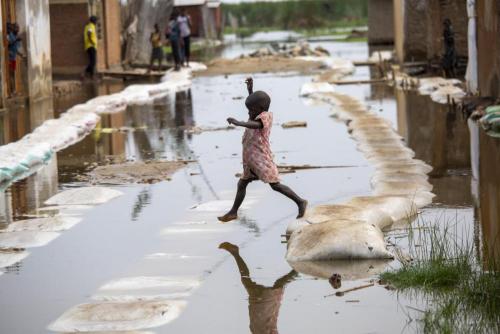
https://www.unicef.org/press-releases/unicef-analysis-finds-just-34-cent...
GENEVA, 2 November 2021 - "2021 is expected to be one of the warmest years on record, according to our colleagues at WMO. And as the mercury in thermometers rises, so does the pressure on governments to take action on climate change at COP26.
"As I speak to you, there have been many statements from world leaders in which the words ‘children’ and ‘young people’ have been mentioned multiple times. But while leaders are once again talking about the impact of the climate crisis on children, too few are yet to turn these words into meaningful actions that actually consider children.
"UNICEF released a new analysis today that reveals that two thirds of countries’ climate plans don’t address the needs and priorities of children.
"We examined the Nationally Determined Contributions – or NDCs – that were updated ahead of COP26, where I am now. These documents are submitted by the countries which had signed the Paris Agreement, and outline the actions they commit to take to meet its goals.
"Of the 103 country plans, UNICEF considers just 35 of them - or about one-third - to be child sensitive.
"Only 1 in 5 reference child rights or intergenerational justice and equity in a meaningful way.
"Only 12% report that children participated in the development of the plan.
"Countries are saying the right things about considering and including children but their climate plans leave their promises hollow. Children and young people bring energy, leadership and ideas to the table and yet leaders continue to pay lip service to their demands.
"The climate crisis is a child rights crisis.
"In August, UNICEF published The Children’s Climate Risk Index which revealed that 99 per cent of the world’s 2.2 billion children - virtually all of them - are exposed to at least one environmental threat, including heatwaves, cyclones, flooding, drought, vector-borne diseases, air pollution and lead poisoning.
"Roughly 1 billion children live in countries that are at “extremely high-risk” of the threats of climate change. These children face multiple, compounding climate shocks, threatening their health, education and very survival.
"To respond to the climate crisis, with the interests of children at the heart of all decisions, UNICEF is imploring governments to take three actions:
- Increase investment in climate adaptation and resilience
Children in communities that have contributed the least to global emissions will face the greatest impacts of climate change. These are communities that will see the greatest growth in child population over the coming decades; and for these children mitigation to cut CO2 emissions will come too late given emissions reductions will take decades to have an impact on the climate impacts we have already baked in. Building the resilience of the social services that these children depend upon - water, health and education - is critical to reduce the risks they will face.
UNICEF urges developed countries to exceed their 2009 promise to mobilise $US100 billion annually in climate finance in light of evidence that these sums are insufficient to address the scale of climate impacts. UNICEF urges a greater emphasis on funding to build climate resilience and adaptive capacity.
- Reduce greenhouse gas emissions
Adaptation can only do so much and it is imperative that at COP26, leaders commit to cutting emissions faster and deeper. The world’s children cannot afford further delay.
UNICEF is urging countries to cut their emissions by at least 45 per cent (compared to 2010 levels) by 2030 to keep warming to no more than 1.5 degrees Celsius.
- Include young people in all climate negotiations and decisions
As today’s analysis confirms, children and young people continue to be underrepresented in policies and climate discussions, even though they are the most critical clients for sustainable solutions. This limits their ability to influence decisions that are critical to their future and doesn’t help them lead the world they will inherit.
"Every child and young person alive today was born into a world fully aware of the consequences of inaction on climate change, yet leaders are unable to agree on measures to stop it.
"The international community must use the remaining discussions at COP26 to turn words into action. They must create safer communities for the children affected now and agree on a path forward to prevent the worst impacts of climate change for people everywhere."
# # # # #










Add new comment